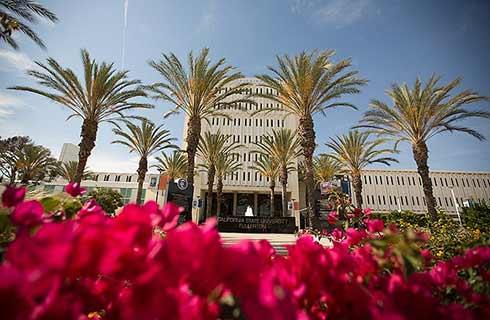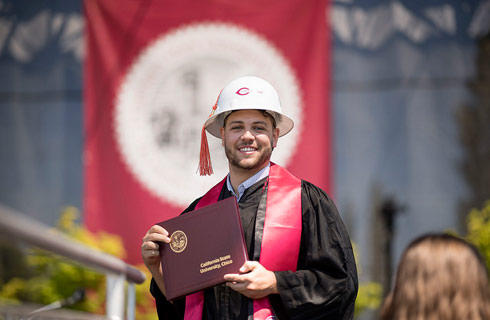核工程理学硕士
Master of Science in Nuclear Engineering

学历文凭
Masters Degree

专业院系
School of Engineering

开学时间

课程时长

课程学费

国际学生入学条件
Program of Interest. If you are pursuing an MS with a concentration in Radiation Protection or Medical Physics, please select this concentration in the Interest field. If you are not pursuing either concentration, please select Undecided from the drop-down list.
The General GRE is encouraged but not required. The Institution Code is 4845 if you send your score report directly from the testing service (ets.org).
Letter of intent that summarizes your qualifications, professional goals, and indicates the area of nuclear engineering which you want to pursue. You may refer to the guidelines for writing this letter.
CV/Resume
International students must achieve a minimum score on the TOEFL of 550 on the paper exam, 213 on the computer exam, or 79-80 on the internet-based test, a score of 7.0 on the IELTS
IDP—雅思考试联合主办方

雅思考试总分
7.0
- 雅思总分:7
- 托福网考总分:79
- 托福笔试总分:550
- 其他语言考试:A minimum score of C on the CPE or CAE test
CRICOS代码:
申请截止日期: 请与IDP联系 以获取详细信息。
课程简介
The nuclear engineering research graduate programs at the University of New Mexico include nuclear criticality safety, radiation transport, reactor theory, single and two-phase flow in microgravity, space nuclear power, thermal-hydraulics, fusion energy, accelerator physics and engineering, occupational and environmental radiation protection, plasma physics, nuclear activation diagnostics, high energy density physics, reactor and shielding design, nuclear fuel irradiation behavior, theoretical and numerical methods in neutral and stochastic transport theory, charged particle transport, model-reference adaptive control of nuclear power plants, heat pipes for space application, computational methods for heat transfer and fluid flows, single phase laminar and combined flows, two-phase flows and probabilistic risk assessment.<br><br>The Master of Science (M.S.) in Nuclear Engineering is a “traditional” nuclear engineering program. Graduates in engineering or science from any recognized college or university may apply for admission to graduate study in nuclear engineering. Students planning to do graduate work in nuclear engineering should focus on physics, mathematics and nuclear engineering in their undergraduate coursework in addition to acquiring competence in one of the branches of engineering or science. Undergraduate coursework in the following is recommended: atomic and nuclear physics, advanced applied mathematics, computer programming, thermodynamics and heat transfer, fluid mechanics, principles of circuits, materials science, nuclear measurements, reactor physics, and instrumentation.
相关申请
 预科
预科 奖学金
奖学金 实习机会
实习机会 在校学习
在校学习 跨境学习
跨境学习 校园授课-线上开始
校园授课-线上开始 在线/远程学习
在线/远程学习
开学时间&学费
学费信息仅供参考,请与IDP联系以获取详细信息
| 开学时间 | 时长 | 学费 | 地点 |
|---|
学校排名

世界排名301
数据源:
泰晤士高等教育世界大学排名
本校相关课程

Master of Science in Optical Science and Engineering
学历文凭
Masters Degree
开学日期
课程费用总额


Master of Science in Earth and Planetary Sciences
学历文凭
Masters Degree
开学日期
课程费用总额


Doctor of Philosophy in English - Medieval Studies
学历文凭
Ph.D.
开学日期
课程费用总额


Master of Arts in English - Medieval Studies
学历文凭
Masters Degree
开学日期
课程费用总额


法文研究哲学博士
学历文凭
Ph.D.
开学日期
课程费用总额


Master of Arts in French
学历文凭
Masters Degree
开学日期
课程费用总额

其他相关课程

核工程学硕士
 安大略理工大学
安大略理工大学泰晤士高等教育世界大学排名:915
学历文凭
Masters Degree
开学日期
课程费用总额


核工程应用科学硕士
 安大略理工大学
安大略理工大学泰晤士高等教育世界大学排名:915
学历文凭
Masters Degree
开学日期
课程费用总额


核工程哲学博士(PhD)
 安大略理工大学
安大略理工大学泰晤士高等教育世界大学排名:915
学历文凭
Ph.D.
开学日期
课程费用总额


核工程学工程和管理(荣誉)学士学位
 安大略理工大学
安大略理工大学泰晤士高等教育世界大学排名:915
学历文凭
Bachelor Degree with Honours
开学日期
课程费用总额


核工程学学士学位(荣誉学位)
 安大略理工大学
安大略理工大学泰晤士高等教育世界大学排名:915
学历文凭
Bachelor Degree with Honours
开学日期
课程费用总额


Master of Engineering in Civil Engineering - Nuclear Engineering
 滑铁卢大学
滑铁卢大学学历文凭
Masters Degree
开学日期
课程费用总额










 美国
美国
